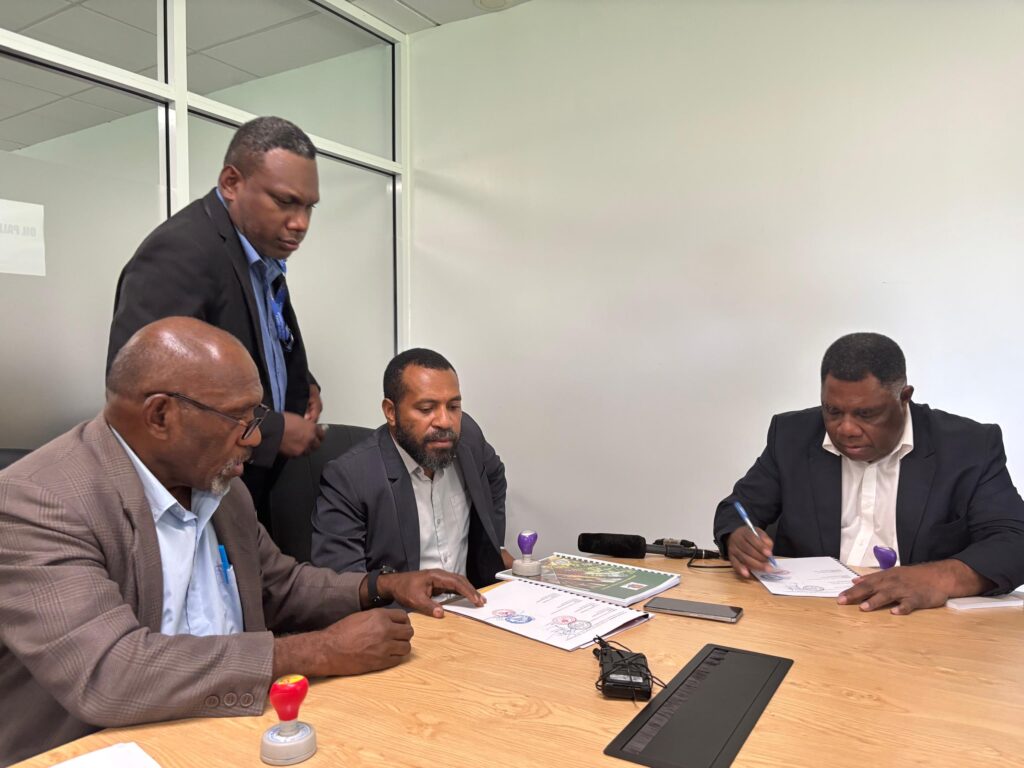Port Moresby, Thursday 17 April 2025 – In a significant milestone for Papua New Guinea’s agriculture sector, the Madang Provincial Government and the Oil Palm Industry Corporation (OPIC) have signed a landmark Memorandum of Understanding (MoU) in Port Moresby that sets the foundation for a new era of inclusive, regulated, and sustainable oil palm development.
The MoU was signed by OPIC General Secretary Kepson Pupita and Madang Acting Provincial Administrator Daniel Aloi in the presence of Minister for Oil Palm Hon. Francis Maneke and Madang Governor Hon. Ramsey Pariwa, and is the first formal provincial partnership under the new Ministry of Oil Palm, making Madang the pilot province for an innovative model that brings together national government agencies, provincial authorities, landowners, and the private sector.
“This is a historic day for our industry and our country,” Minister Maneke said. “For decades, oil palm has developed without proper oversight or equitable participation. Today, we are charting a new path—one that is guided by law, rooted in sustainability, and driven by our people.”
A Turning Point for Oil Palm Development
Oil palm remains one of Papua New Guinea’s most valuable agricultural commodities, contributing significantly to rural incomes and foreign exchange earnings. Yet for over 50 years, the sector has largely been sustained by private milling companies, with minimal government involvement and limited benefits flowing directly to customary landowners.
Minister Maneke noted that the Marape-Rosso Government, in its drive to boost agriculture and reduce dependency on imports, has prioritised the transformation of the oil palm industry. This includes:
- The creation of the Ministry of Oil Palm,
- The approval of a National Oil Palm Development Policy, and
- The drafting of a comprehensive Oil Palm Industry Bill, which is now in final consultation stages.
“Our government has made the strategic decision to reclaim ownership of this industry and build a framework where landowners, provinces, and developers work together,” Minister Maneke said.
Landowner Empowerment and Customary Land Reform
The MoU signed with the Madang Provincial Government includes a strong focus on customary land registration, demarcation, and mobilisation—a key challenge that has hampered the expansion of commercial agriculture in PNG.
“We will work with the Department of Lands and the provincial administration to ensure landowners gain secure titles,” Minister Maneke explained. “This makes land bankable and ensures landowners are not just bystanders but active shareholders in oil palm investments.”
This includes support for converting vast stretches of underutilised grassland in areas like the Ramu Valley into productive oil palm plantations, with full adherence to environmental and sustainability standards.
The partnership also includes collaboration with existing milling companies such as Ramu Agri Industries, while also allowing for new investment models under OPIC’s coordination where appropriate.

Market Access and Global Standards
Minister Maneke underscored the importance of meeting global sustainability standards, such as the Roundtable on Sustainable Palm Oil (RSPO), if PNG is to retain and expand its premium export markets, particularly in Europe.
“We must develop the industry with a global mindset,” he said. “We cannot afford to lose markets because we failed to meet environmental or traceability requirements.”
He added that PNG’s existing oil palm exports are already respected for their high quality, and that with proper regulatory backing and landowner inclusion, the industry can expand rapidly while maintaining global competitiveness.
Madang Leads the Way, Others to Follow
Minister Maneke commended Madang Governor Hon. Ramsey Pariwa for showing political leadership and courage in stepping forward as the first provincial government to embrace the reforms.
“Governor Pariwa has set a benchmark for all provinces,” he said. “Despite all the pressures and noise, he continues to focus on long-term, meaningful development for his people.”
The signing is expected to be followed by similar partnerships with Morobe, Central, East New Britain, and West New Britain, as OPIC and the Oil Palm Ministry roll out their reform agenda nationwide.
Legislative and Institutional Overhaul
The new legislation being finalised will address long-standing gaps, including:
- Legal recognition of smallholder developments on customary land
- Formal government oversight of all oil palm agreements
- Mechanisms for benefit-sharing between landowners, provinces, and the state
- Strengthened roles for OPIC and a new regulatory body, the National Palm Oil Industry Authority
Minister Maneke stressed that this legislation is being carefully drafted to incorporate input from provincial leaders, landowners, and industry stakeholders, and to ensure it reflects both the realities on the ground and international best practice.
Building PNG’s Next 50 Years
As Papua New Guinea marks its Golden Jubilee of Independence in 2025, the Government is determined to use this moment to reset key sectors and lay down lasting foundations for the next 50 years.
“This MoU is not just about oil palm—it’s about economic sovereignty, food security, and rural transformation,” Minister Maneke said. “It’s about correcting decades of imbalance and unlocking our nation’s full agricultural potential.”
The event concluded with commitments from both the Madang administration and OPIC to begin immediate preparations for land mobilisation, investor consultations, awareness drives, and environmental baseline assessments in targeted development zones.
“What we are witnessing here today is the birth of a new chapter,” Minister Maneke said. “And as we say in this Jubilee year—PNG at 50 is just the beginning.”